
Premium expansion: BC pellet plant ups production, takes on bio-log processing
August 9, 2022
By
Maria Church
Driven by the need to utilize a higher percentage of harvesting residuals, Premium Pellet's expansion project includes a new triple-pass rotary dryer, as well as four additional pellet mills.
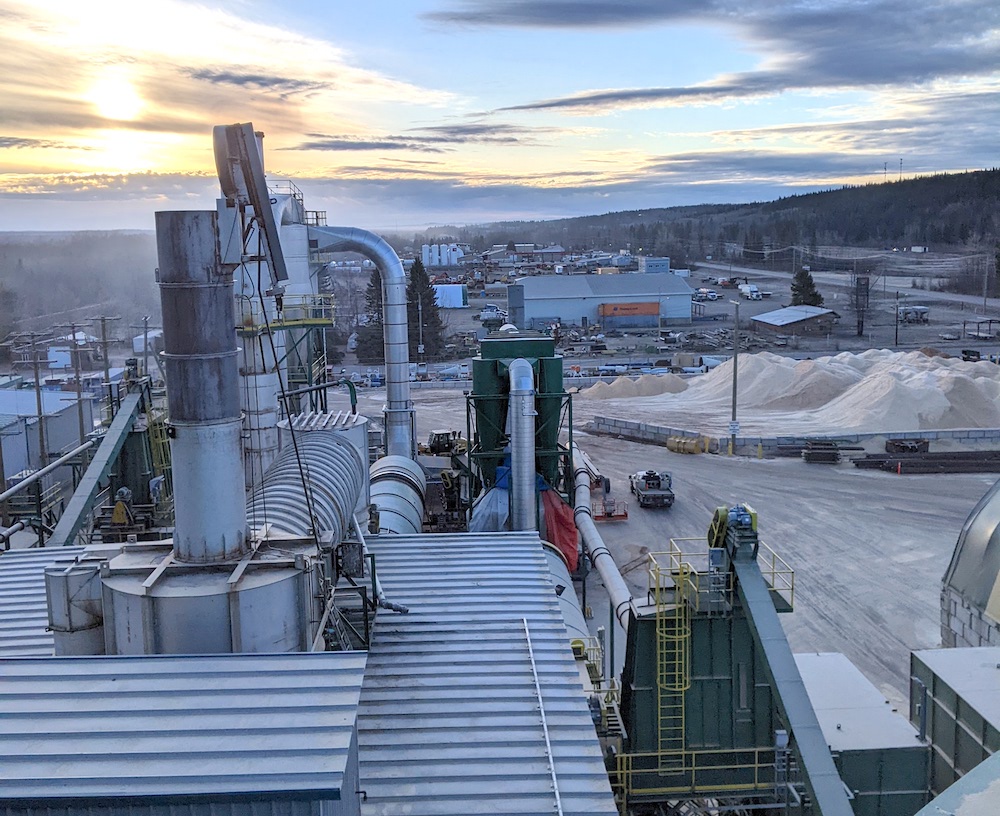 Premium Pellet’s expansion project will enable them to produce nearly 275,000 tonnes of wood pellets a year, making it the fourth highest producing pellet plant in Canada. Photo by William Berg, supervisor at Premium Pellet.
Premium Pellet’s expansion project will enable them to produce nearly 275,000 tonnes of wood pellets a year, making it the fourth highest producing pellet plant in Canada. Photo by William Berg, supervisor at Premium Pellet. Premium Pellet in Vanderhoof, B.C., is in the midst of a massive cap-ex project that will nearly double its capacity while allowing the facility to accept more low-grade forestry residuals.
The $10- to $12-million expansion project has been more than a year in the making with several lengthy setbacks from now-familiar challenges such as labour shortages and supply chains, but the team is finally eying the finish line.
Site manager Darrel Mohns tells Canadian Biomass the project is mainly driven by the shift in fibre balance within the region. With increased fibre demand, Premium Pellet has had to rely on more harvesting residuals or biofibre to meet its needs.
“Because of that wetter fibre, we knew we needed to add more drying capacity,” Mohns says. The project saw a new triple-pass rotary dryer as well as four additional pellet mills installed, among other components to handle the additional capacity.
Premium Pellet is one of three arms of Nechako Lumber, part of Prince George, B.C.-based Sinclar Group Forest Products Ltd. About an hour’s-drive west of Prince George, the Vanderhoof site is home to a small-log sawmill, a bioenergy plant, and the pellet plant. The fully integrated operation adds value to every part of each log that enters its gates.
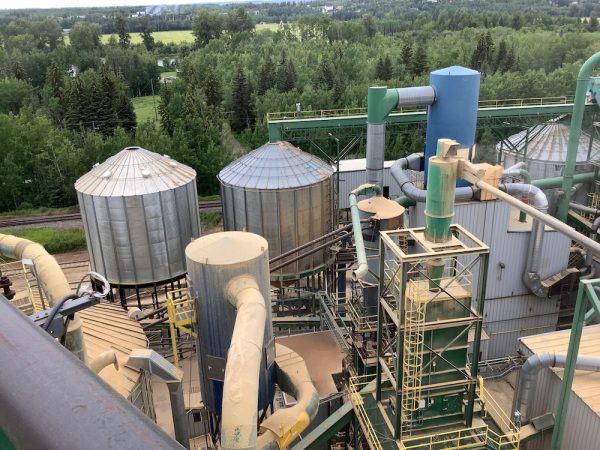
Nearly all of Premium Pellet’s new equipment was installed next to existing systems, doubling capacity.
Premium Pellet began operations in 2001. The pellet producer offers a unique product, exclusively producing high-grade white wood pellets with about 10 per cent of the pellets bagged for the residential market and 90 per cent shipped in bulk to overseas markets.
With all expansion components in place, Premium Pellet expects to consume nearly 240,000 oven-dried tonnes and have a production capacity of 275,000 tonnes annually – making it the fourth highest producing pellet plant in Canada.
Project scope
Before 2018, the plant ingested around 60 per cent dry fibre from sawmill residuals and 40 per cent wet material that required drying. Today, that mix has flipped, and sourcing the dry fibre is becoming more and more difficult, Mohns says.
“Lumber operations are now running reduced shifts, fewer days. And [sawmill residuals] supply was tight before they started to do that. A couple sawmills have come offline making it more difficult to source dry fibre,” Mohns says.
Bio log is now the most readily available feedstock, but the plant needed to re-tool for it. Premium Pellet sourced used equipment for this project, purchasing everything from a recently dismantled U.S. pellet plant.
“We ended up going into an expansion project, had that old mill dismantled and shipped to us, and we’ve been basically assembling that around the plant here. It’s been over a year already, with Phase 1 ready to run once we receive our Ministry of Environment (MOE) permit. We’re well into Phase 2, which is installing all the pellet manufacturing equipment and external pieces,” Mohns says.
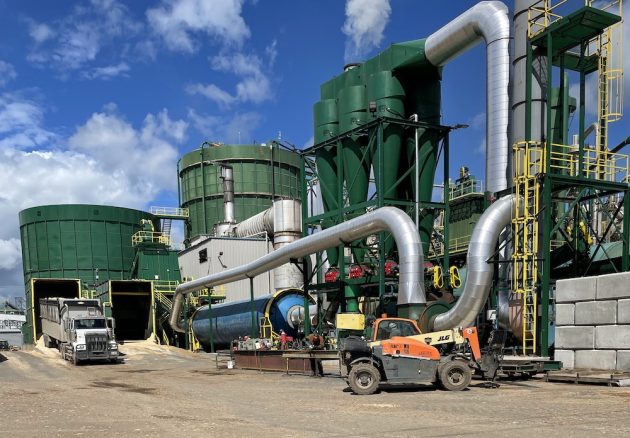
Phase 1 of the project saw the installation of a MEC gas-burning triple pass dryer to run alongside the current MEC wood-burning dryer. A Fisher Klosterman Multi Cyclone was also installed.
Phase 1 involved the installation of a Brunette BioSizer to run alongside the current Bliss 4460 hammermill, ensuring the fibre – whether it’s sawmill residuals or chipped bio logs – is a consistent size. The used MEC 12×60 dryer was also installed in Phase 1, along with a Kinedizer 14-inch 40 MBTU gas burner. The drying equipment runs parallel to the current MEC 56000 pounds/hr WB dryer. A Fisher Klosterman Multi Cyclone has been installed.
Phase 2 of the project is focused on increasing pelletizing capacity. A third dry hammermill was installed as well as four additional Bliss Pioneer 200 pellet mills, bringing the plant’s total up to nine. Additional pellet cooling and storing equipment was also added to the current BM&M shaker screen and Bliss cooling tower to handle the extra capacity. Phase 2 also saw the relocation of the Hamer packaging system to fit in the new equipment.
“Inside the plant, we’ve had to add some expansions on to fit some of the equipment coming in. We’ve had to break into the concrete, reinforce the footings for the roof supports for everything coming in and hanging off of it,” Mohns says. “We’ve had to put in new transformers, electrical rooms, power distribution centre (PDC) rooms, and run power to feed all of the equipment”
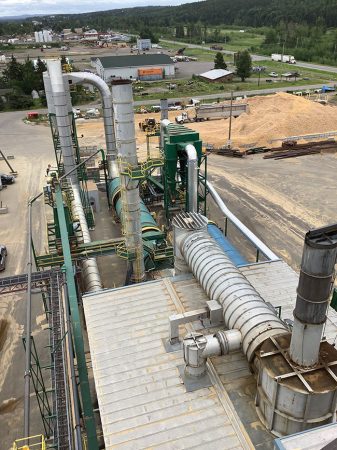
With all expansion components in place, Premium Pellet expects to consume nearly 240,000 oven-dried tonnes and have a production capacity of 275,000 tonnes annually.
The Nechako site has a stockpile of bio logs on site that have been drying out for a year and a half, giving them an ideal lower moisture content. The logs are currently processed on site with a Peterson mobile horizontal grinder that is brought in as needed by a contractor. Mohns says they’re eyeing a more permanent solution.
Phase 3 of the project is focused on the plant’s air emissions controls and includes studies to determine if and what size of a wet electrostatic precipitator (WESP) would be needed. The WESP would be a substantial initial investment as well as continual maintenance.
“We’re trying to put the best technology out there in place,” Mohns says. “In our studies, [the current system] ran much cleaner than we anticipated.”
Obstacles
“There have been multiple challenges finding supplies and people for the project. Then you add in COVID. You name it, we’ve run into it,” Mohns says. “So, we made some changes. We’ve been doing a lot of this project internally with our onsite fabrication team”.
The in-house aspect has led to both savings and additional challenges, he says. “It slows it down maybe a little bit, but it does really reduce our costs. Being a smaller town, usually any contractors are driving up, driving back. All that travel and LOA [living out allowance] costs really start to add up.”
While staff built a new set of skills by taking on the integration project, other aspects of their jobs such as preventative maintenance often drop down the list of priorities. That has once again become a focus as the project dust settles.
Rail transportation continues to be a challenge for many forestry operations across the country, and Nechako is no exception. The company recently completed a study on their rail line that may lead to a large rail expansion that would give Nechako and Premium Pellet increased flexibility when it comes to shipping their product to market.
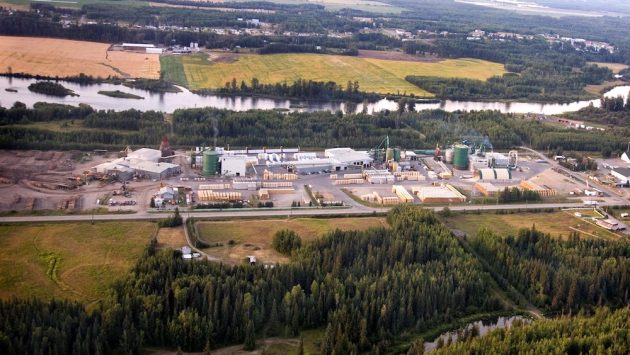
Premium Pellet is co-located in Vanderhoof with Nechako Lumber and Nechako Green Energy, all three of which are owned by Prince George, B.C.-based Sinclar Group. The pellet plant exclusively produces a high-grade white wood pellet.
On the horizon
All regulatory requirements and public consultations on the expansion are completed and submitted for review at this point. “We’re hoping to have everything up and running by September or October,” Mohns says.
As the project wraps up, Mohns’ attention is turned again to the larger challenges with fibre supply in B.C. “With the provincial government’s various fibre initiatives, we are continuing to focus on building relationships with key stakeholders and looking for internal opportunities to add value to marginal logs,” Mohns says.
For years Nechako has partnered with First Nations logging groups and mills. Nechako Lumber has enjoyed a long-term relationship with Saik’uz First Nations and currently has an agreement co-managing a 10-year forest licence targeting small profile wood within the Saik’uz traditional territory. The small profile includes mountain pine beetle-killed pine, which provides biofibre for Premium Pellet.
Also, on the horizon for Premium Pellet is a branding refresh that will proudly display the company’s wood pellet quality and sustainability certification. In 2017, Premium became the first pellet producer in Canada to hold both Sustainable Biomass Program (SBP) Certification and ENplus/CANplus certification.
Premium Pellet is a founding member of the Wood Pellet Association of Canada and continues its support today and into the future.
Print this page